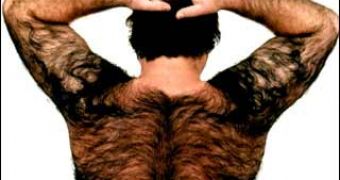Desmond Morris, the famous zoologist and ethologist, called the human species "the naked ape" and said that nudity is the main trait that differentiates the human species from all other primates.
There are many hypotheses trying to explain the lack of body hair in humans, including the aquatic theories.
Now Medical Hypotheses has announced the winner of the 2006 David Horrobin Prize for medical theory as being Judith Rich-Harris, author of the article "Parental selection: a third selection process in the evolution of human hairlessness and skin color".
The ?1,000 annual award, launched in 2004, honors Dr. David Horrobin, the renowned researcher and founder of Medical Hypotheses, who died in 2003.
Harris launches a new hypothesis that describes Stone Age communities in which the mother of a newborn is faced with a shortage of food which limits her chances of feeding her baby. The newborn's look probably influenced the mother in keeping or abandoning it. A baby that looked healthy and attractive was more likely to be kept and raised.
She thinks that this kind of parental selection could have been a main evolutionary drive.
If Paleolithic (Ancient Stone Age) people found the hairless babies more attractive than hairy ones, this could have led to the current morphology of our species: a furless ape.
Harris believes that Neanderthals must have been furry, a crucial trait to survive the Ice Age, as their technology was less developed than that of Homo sapiens.
Our own species, Homo species, would have regarded them as "animals" and potential prey, thus this hypothesis also sustains that Neanderthals would have gone extinct as they were hunted and eaten by modern humans.
"This paper is an excellent example of the kind of bold thinking and theorizing which David Horrobin intended to encourage when he began Medical Hypotheses. I hope that Judith Rich Harris' idea provokes debate and further investigation of this topic", said Professor Jonathan Rees of Edinburgh University, Scotland, co-discoverer of the "red hair gene" and this year's prize judge.

 14 DAY TRIAL //
14 DAY TRIAL //